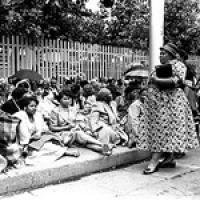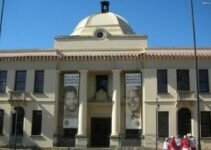South Africa has a rich history, including accomplishments and challenges, happiness and sadness. Every day is an opportunity to discover a new story. Today, on February 25, we will begin a journey to explore the events on this particular date.

1994: The Women’s National Coalition Conference starts
The Women’s National Coalition Conference took place from February 25–27, 1994, in Kempton Park. The conference focused on drafting the Women’s Charter and its future. The final charter was adopted on the last day of the conference, but with a note stating that member organizations could reserve their positions on specific clauses.
1991: Chief Mhlabunzima Maphumulo is shot dead
The president of the traditional leaders organisation CONTRALESA and African National Congress (ANC) stalwart, Chief Mhlabunzima Maphumulo, was gunned down in the driveway of his home in Pietermaritzburg. Maphumulo was a chief from the Maqongqo/Table Mountain area, east of Pietermaritzburg. He had survived a previous attempt on his life when his house was burned down. According to an alleged “hit-squad” operative, the Pietermaritzburg police planned the murder and paid the assassins R5000 each. Judge N.S. Page found in his judicial inquest the testimony of this witness and another alleged “hit-squad” witness ‘unreliable’, ‘appalling’, and ‘even worse’. A subsequent probe by the Truth and Reconciliation Commission (TRC), paying no attention to the conflicting judicial ruling, nevertheless found that Chief Maphumulo had been targeted for attack in a planned hit-squad operation. The TRC discarded Page’s judgment, but failed to provide evidence to prove its own contrary conclusion.
1990: Mandela addresses ANC rally in Durban
Nelson Mandela addressed a rally of over 100,000 people in Durban, urging ANC supporters to discard their weapons and embrace peace. He commended Chief Mangosuthu Buthelezi for his role in opposing apartheid and stressed the need for a united front against oppression, highlighting the ANC’s position as the principal political movement in South Africa.
1965: Archbishop Owen Cardinal McCann becomes South Africa’s first cardinal
Roman Catholic Church Archbishop of Cape Town, Owen McCann, an enemy of Apartheid, became South Africa’s first Cardinal when he was invested by Pope Paul VI in St. Peter’s Basilica. Early in Cardinal McCann’s tenure as Archbishop, the South African Catholic Church began campaigning against Apartheid. In 1976, in an open letter to the government, he made a particularly strong attack on its racial segregation policy and related matters. His attack came at the height of anti-government rioting in black communities. In 1988, Cardinal McCann accompanied the Pope on his visit to five African nations, not including South Africa. During the journey, Pope John Paul II also voiced strong criticism of Apartheid.
1971: Arthur Ashe is denied visa by South African Government
The South African government refuses a visa application from the African-American tennis player, Arthur Ashe, to visit South Africa to take part in the national championships to be held at Ellis Park in April. Arthur Ashe campaigned against apartheid in South Africa and called for South Africa to be expelled from the International Lawns Federation. Ashe was the first black man to win the US championship in 1968. He died on February 6, 1993, from an AIDS-related illness.
1937: SA artist, Daniel Sefundi Rakgoathe is born
Daniel (D an) Sefundi Rakgoathe, born in 1937, was the first full-time student in the fine arts section at Rorke’s Drift. He later completed an MA degree in African Studies at the University of California, Los Angeles and has exhibited his work internationally.
1930: Petrus Jacobus (Arrie) Paulus is born
Petrus Jacobus (Arrie) Paulus, General Secretary of the Mineworkers’ Union in 1967, is born in Pretoria.



